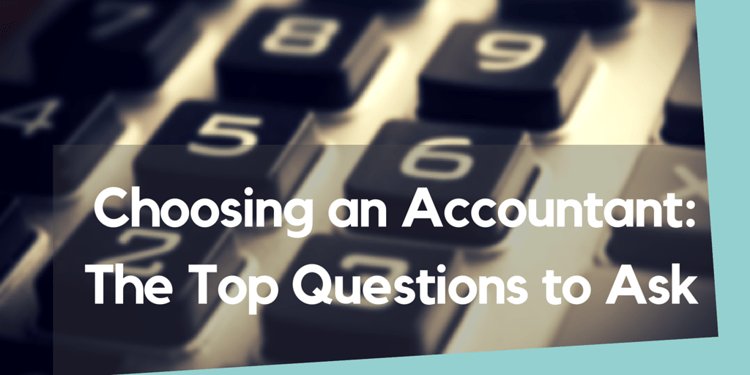When it comes to choosing an accountant, or employing the services of someone to look after your small business accounting needs, the Internet is a vast place full of all sorts of accounting firms of all shapes and sizes offering to help you save money, pay less tax, and to make your business finances more straightforward.
So how can you be sure that you will get the best accountant for your budget and needs? Let’s look at our top 9 questions to ask when choosing an accountant…

Why use an accountant
If you're marketing smartly and consistently, getting involved with social media (using valuable resources like Twitter Hours) and improving your business networking, sooner or later you're going to be in a situation where you have lots of new work to keep you busy.
Being busy is a great problem to have, but it does mean keeping on top of your business finances and your small business accounting can be tricky.
This is especially true if you’re new to business, aren’t very numerically minded, or frankly, just don’t have the time to keep on top of your accounts. There’s usually more work involved than people think, and whilst it becomes easier once you have a system in place, navigating the world of HMRC is made much smoother by having the help of an experienced accounting professional by your side.
That’s why choosing an accountant to look after the financials and tax related affairs of your company is a popular decision for many businesses, and there are lots of different accountancy firms to choose from to meet your small business accounting needs.
But, by considering your options and asking the right questions, you’ll end up with a great relationship with an accountant that has a genuine interest in seeing and helping your business succeed. They’ll gain a deep understanding of your company and help your profits by reducing your tax liabilities through their specialist knowledge.
So, what sort of questions should you ask to help you decide on the best accountant to deal with your small business accounting needs? Here’s our top 9...
1 - Who will you deal with?
If you’re talking to a small accountancy firm with a handful of staff then it’s likely you’ll deal with an accountant directly, maybe the owner of the company, but most probably the person doing the work.
However, if you’re looking into a larger accountancy firm, or a more geographically diverse one, then it might be you have different points of contact: a salesperson may have been your first port of call as an introduction to the firm, but then you’re passed onto an account manager for your ongoing interactions once you’re a customer, leaving the physical accountancy work to the behind-the-scenes team.
It’s important to know who you’re dealing with, what their skills are and their position within the company. For example, if you’re a smaller business, or need more help and support with your accounts, then dealing with an accountant directly might be more suitable for your needs. On the other hand, if you don’t need to be in such close contact with the person actually running the numbers, then working with an account manager or other inbetween role might suit you.
2 - How are the fees structured?
 Depending on your needs accountancy fees usually fall into two types:
Depending on your needs accountancy fees usually fall into two types:
- Fixed, per service
- Ongoing regular payment scheme - e.g. monthly, or quarterly
However, different accountants, like all service-based agents, use different pricing structures depending on their own processes, the services they’re offering, and the individual client needs.
Knowing how fees are set out will help you budget your costs and cash flow and avoid any surprise payments you might be unaware of later down the line.
Another point to consider is if your accountants bundle any supplemental services into their fees, such as an accountancy software subscription (something like Xero, or FreeAgent). If they’re not included then how much extra are they, or if they are included, are they negotiable?
3 - What are their recommendations for record keeping?
There are some things in life where there really is only one way of doing it. When it comes to record keeping for your accounts, however, everyone has their own way that works for them.
Some people keep records manually: paper invoices, receipts, and notebooks. Others prefer to digitise their record keeping, using software or phone apps.
 The important thing to remember is what works for you, works for you. Any good accountant should be able to offer you a few different record keeping recommendations, especially if you’re making hard work for yourself at the moment, but ultimately they should be prepared to fit around your way of working and your current processes and systems.
The important thing to remember is what works for you, works for you. Any good accountant should be able to offer you a few different record keeping recommendations, especially if you’re making hard work for yourself at the moment, but ultimately they should be prepared to fit around your way of working and your current processes and systems.
If they strictly recommend one particular way of keeping records, or are less flexible, then you’ll need to ask if there are any additional charges involved to accommodate your preferences.
4 - How will they provide value?
Boiling it all down. the basic function of an accountant is to take your records, do the leg work of processing your company’s financial figures, making sure it all adds up, and finally, presenting you with the smallest possible tax bill that you owe to HMRC.
But the question here is really one for yourself to begin with: how much support and advice do you need, and what other services could you use from your accountant?
Depending on what you need will determine what value any particular accountant can bring; some are much better with smaller businesses, others have more comprehensive support systems in place, while others just offer standard accountancy work without any business development advice.
5 - Do they have experience in your industry?
It’s not a deal breaker if they don’t, but if you’re in a very niche area of business, finding an accountant that has experience with, or specialises in that niche may mean bigger tax savings or allow them to leverage special financial breaks that other, less experienced accountants may not be aware of.
6 - Do they support your existing systems?
Linking in with question 3 about record keeping, it’s very useful to know what systems your potential accountant supports, promotes, or has knowledge of.
 Again, it shouldn’t be a deal breaker, but generally your accountant should support your way of working, or at least be able to help you transition seamlessly to their system if you both think it will benefit you and your business in the long term.
Again, it shouldn’t be a deal breaker, but generally your accountant should support your way of working, or at least be able to help you transition seamlessly to their system if you both think it will benefit you and your business in the long term.
However, an accountant that has zero familiarity with Xero, for example, might struggle to be as efficient as one who does as they’ll have to invest some time in climbing the learning curve of a new software system or way of working.
Plus, if they’re big users and advocates of the same systems as you, then they may even be able to provide even greater value by showing you some new ways of using your systems to get more from them.
7 - Are they qualified?
This is probably the most important question you could ask because as a business owner you are ultimately legally responsible for the running and financial reporting of your company. If your accountant gets things wrong, they may be partly responsible, but you will still share the consequences.
Now, the term ‘accountant’ isn’t a restricted term; generally speaking, anyone can practice as an accountant without needing qualifications or any membership to certain bodies (although auditing work requires an audit licence).
 However, given the importance of getting your business finances right, it’s probably best you choose an accountant who is a member of well known national or international bodies. What well-respected memberships highlight is a dedication to a particular code of standards, and many bodies carry out audits and regular checks on their members to make sure they meet the standards.
However, given the importance of getting your business finances right, it’s probably best you choose an accountant who is a member of well known national or international bodies. What well-respected memberships highlight is a dedication to a particular code of standards, and many bodies carry out audits and regular checks on their members to make sure they meet the standards.
Some well known accounting bodies are the ICAEW and ICAS, which allow accountants to use the title ‘Chartered Accountant’. Generally Accepted Accounting Practice (GAAP) is another body of standards that sets out some common expectations and ways of working that accountants should adhere to.
Memberships and associations are great, but it’s also worth asking about their ongoing continued professional development (CPD). Accountants that dedicate a portion of time each year to making sure they’re continually learning and improving. keeping on top of new tax information and ways of working are more likely to invest that time back into their clients by being proactive on their behalf and offering current information that will help their business grow.
8 - What previous experience & success stories do they have?
Does your potential account have experience with businesses similar to yours: size, function, trading means, turnover, etc.? What sort of successes can they talk about with previous clients, especially those in a similar position to you?
Do they mainly deal with SME’s, micro businesses, or large conglomerates? Do they only deal with limited companies or primarily sole traders?

Working with an accountant whose clients are similar in nature to you could be a better fit for your needs. If they primarily work with sole traders and you want to come onboard as a medium-sized limited company, they may not have the capacity to provide as efficient a service, or might not be able to give you as much advice and support as you need.
If they do have lots of previous experience with other companies like yours then you’ll be in a better position to see what sorts of savings they can make your company in comparison, and what sort of turnaround times they have for VAT submissions and tax returns.
Ask them to talk about their previous wins for their clients too. Do they regularly save their clients more in tax than their competitors? What sort of savings could they help you make? Be wary of anything that sounds too good to be true, but if they make their clients regular, solid savings then this can only be a good thing.
9 - Will they give you some free advice?
Any decent accountant worth their salt should be happy to part with some advice and steer you onto the right path without asking for money or tying you into a large contract first.
 Obviously don’t expect chapter and verse for nothing, but they should provide you with some helpful, basic consultancy services before you make a decision without holding you to anything.
Obviously don’t expect chapter and verse for nothing, but they should provide you with some helpful, basic consultancy services before you make a decision without holding you to anything.
By asking for some brief advice on a particular financial issue you have, you’ll also be able to gauge the sort of relationship you can expect from them later down the line. Are they honest, open and helpful right from the start, or are they more likely to charge you for little bits of help as you go?
Take your time and make the right choice for your business
Employing the services of a qualified, experienced accountant can make a huge difference to your company. They can take the hassle and headache out of managing your company’s finances, liaise with the HMRC on your behalf, save you money, and ultimately help your business to thrive and grow.
Business is largely about inspiring confidence, trust, and building lasting relationships. It’s something you do with your business and your clients, so make sure you take the time to find the right accountant that you can trust implicitly with your business and you’ll enjoy many years together.



